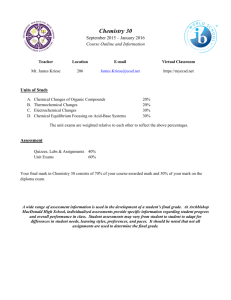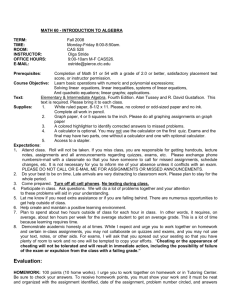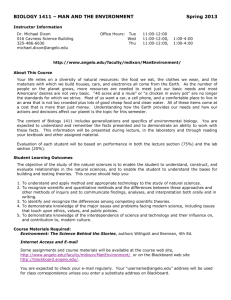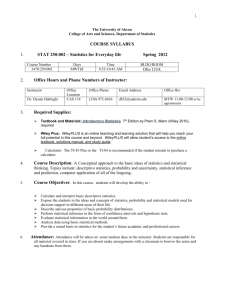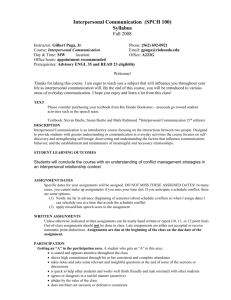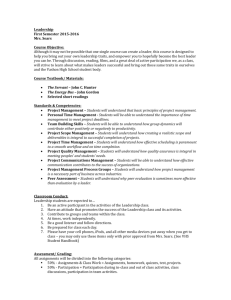Word Document Syllabus - Angelo State University
advertisement
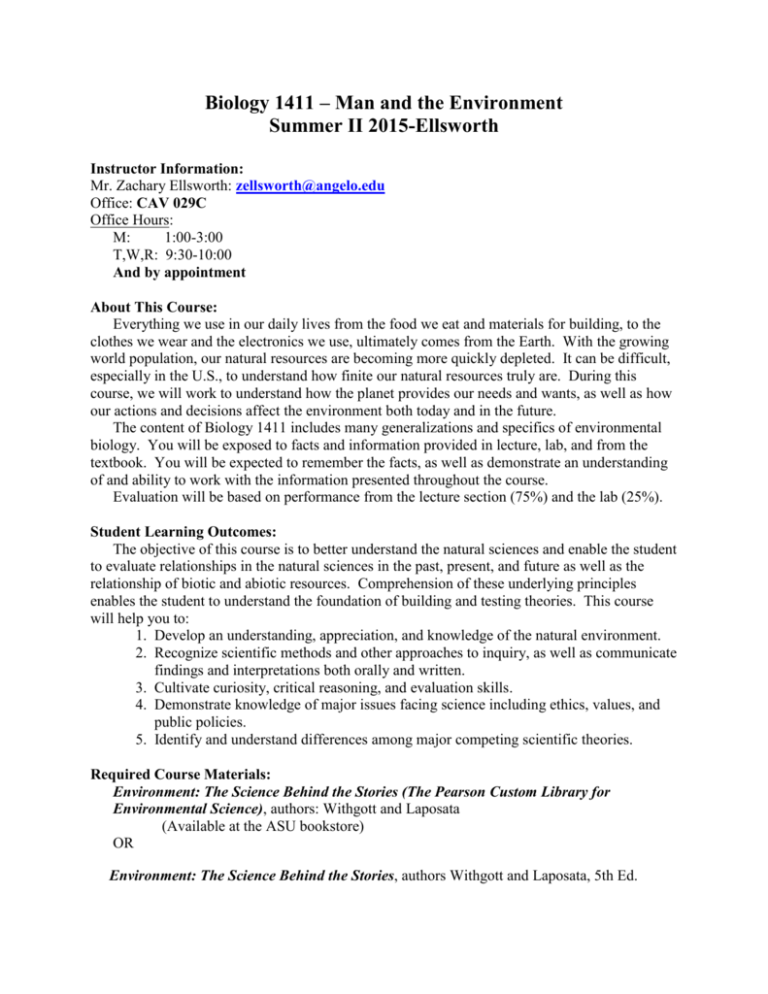
Biology 1411 – Man and the Environment Summer II 2015-Ellsworth Instructor Information: Mr. Zachary Ellsworth: zellsworth@angelo.edu Office: CAV 029C Office Hours: M: 1:00-3:00 T,W,R: 9:30-10:00 And by appointment About This Course: Everything we use in our daily lives from the food we eat and materials for building, to the clothes we wear and the electronics we use, ultimately comes from the Earth. With the growing world population, our natural resources are becoming more quickly depleted. It can be difficult, especially in the U.S., to understand how finite our natural resources truly are. During this course, we will work to understand how the planet provides our needs and wants, as well as how our actions and decisions affect the environment both today and in the future. The content of Biology 1411 includes many generalizations and specifics of environmental biology. You will be exposed to facts and information provided in lecture, lab, and from the textbook. You will be expected to remember the facts, as well as demonstrate an understanding of and ability to work with the information presented throughout the course. Evaluation will be based on performance from the lecture section (75%) and the lab (25%). Student Learning Outcomes: The objective of this course is to better understand the natural sciences and enable the student to evaluate relationships in the natural sciences in the past, present, and future as well as the relationship of biotic and abiotic resources. Comprehension of these underlying principles enables the student to understand the foundation of building and testing theories. This course will help you to: 1. Develop an understanding, appreciation, and knowledge of the natural environment. 2. Recognize scientific methods and other approaches to inquiry, as well as communicate findings and interpretations both orally and written. 3. Cultivate curiosity, critical reasoning, and evaluation skills. 4. Demonstrate knowledge of major issues facing science including ethics, values, and public policies. 5. Identify and understand differences among major competing scientific theories. Required Course Materials: Environment: The Science Behind the Stories (The Pearson Custom Library for Environmental Science), authors: Withgott and Laposata (Available at the ASU bookstore) OR Environment: The Science Behind the Stories, authors Withgott and Laposata, 5th Ed. There is no text for lab; information will be found online. Internet Access and E-mail: Many assignments and other course material will be on the course website: angelo.edu/bio1411 Since e-mail will regularly be used for communication in class correspondence in lecture and lab, you should check your e-mail regularly. Attendance: You are expected to attend all lecture and lab periods. Attendance is paramount in earning a high grade. In lecture, attendance will be taken regularly by turning in a daily in-class assignment. If you are absent for an assignment or quiz, you will receive a zero; missed in-class assignments or quizzes may not be made up. After two unexcused absences, any further absences will result in the loss of two percentage points for each missed day from your final grade. For example, missing 5 days of class will result in an automatic deduction of 9 percentage points (in addition to any missed assignments or quizzes) from your final grade. Exams: There will be a total of 4 exams including a final exam. Each exam will include information presented in class and from the textbook. Exams will be multiple choice, and include some short answer questions. The final exam will be comprehensive worth approximately twice the number of points as the previous exams. No exam grades will be dropped. There will be no make-up exams given for unexcused absences. If you have a legitimate, documented excuse, such as a university-sponsored event, severe personal illness, or death in the family, you must notify me as soon as possible. If you act responsibly, I am willing to work with you. Missing an exam or failing to notify me immediately will result in a zero for that exam. Laboratory: The lab portion will count as 25% of your total grade. There are no tests in the lab section, but there will be daily quizzes and in-class assignments. Lab attendance is mandatory. Labs cannot be made up, however the lowest lab grade will be dropped. Refer to the “Lab Section” page on the class website (angelo.edu/bio1411) for a more complete itinerary and lab information. Special Needs Angelo State University cannot require a student to disclose that they have a disability. However, if you have a disability that requires special accommodation, you should contact the Office of Student Life, Room 100 in the Hardeman Building, phone 942-2191. ASU Faculty have been instructed by the University that “in order to maintain consistency in services across campus”, we are to provide no accommodation without authorization from the Office of Student Life. Religious Holy Day: A student who intends to observe a religious holy day during the semester should make that intention known in writing to the instructor during the first week of the semester and one week prior to the absence. If this submission is completed, a student who is absent from classes for the observance of a religious holy day shall be allowed to take make up missed exams or assignments scheduled for that day in accordance with syllabus policy. Dishonesty: Angelo State University expects its students to maintain complete honesty and integrity in their academic pursuits. Students are responsible for understanding the Academic Honor Code, which is contained in both print and web versions of the Student Handbook. Cheating will not be tolerated and doing so will result in a zero on the current assignment and may warrant additional disciplinary action. Final Grade Calculation: Your grade in this course will be determined by adding all points earned on your tests, quizzes, and any other assignments and then dividing this number by the total number of points possible. This will be your lecture average and it is worth 75% of your course grade. All scores of your laboratory exercises will be averaged together to determine your lab average. This is worth 25% of your course grade. The conventional grading scale will be used: 90-100 = A 80-90 = B 70-80 = C 60-70 = D < 60 = F Summer II 2015 Tentative Lecture Schedule: Date Lecture Topic Reading Assignment M July 6 Introduction, Scientific Method Ch. 1 (pp. 3-20) T July 7 Physical Systems Ch. 2 (pp. 25-48) W July 8 Evolution, Biodiversity Ch. 3 (pp. 53-67) R July 9 Population Ecology Ch. 3 (pp. 67-80) F July 10 Species Interactions Ch. 4 (pp. 83-101) M July 13 FIRST EXAM, Community Ecology Ch. 4 (pp. 101-108) T July 14 Environmental Systems Ch. 5 (pp. 113-120) W July 15 Ecosystems Ecology Ch. 5 (pp.120-139) R July 16 Biodiversity, Conservation Ecology Ch. 9 (pp. 237-267) F July 17 Human Population Ch. 6 (pp. 143-158) M July 20 SECOND EXAM, Human Population Ch. 6 (pp. 158-166) T July 21 Freshwater Systems Ch. 10 (pp. 275-90) W July 22 Freshwater Resources Ch. 10 (pp. 290-302) R July 23 Global Climate Change Ch. 12 (pp.339-362) F July 24 Response to Climate Change Ch. 12 (pp. 363-371) M July 27 THIRD EXAM, Fossil Fuels Ch. 13 (pp. 379-384) T July 28 Fossil Fuels, Impacts Ch. 13 (pp. 384-408) W July 29 Conventional Alternative Energy Ch. 14 (pp. 415-430) R July 30 Bioenergy, Alternative Energy Ch. 14 (pp. 430-440) F July 31 New Renewable Energy Alternatives Ch. 15 (pp. 445-471) M August 3 Agriculture, Biotechnology Ch. 8 (pp.203-217) T August 4 Agriculture, Future of Food Ch. 8 (pp. 217-230) W August 5 FINAL EXAM 10:00 AM

